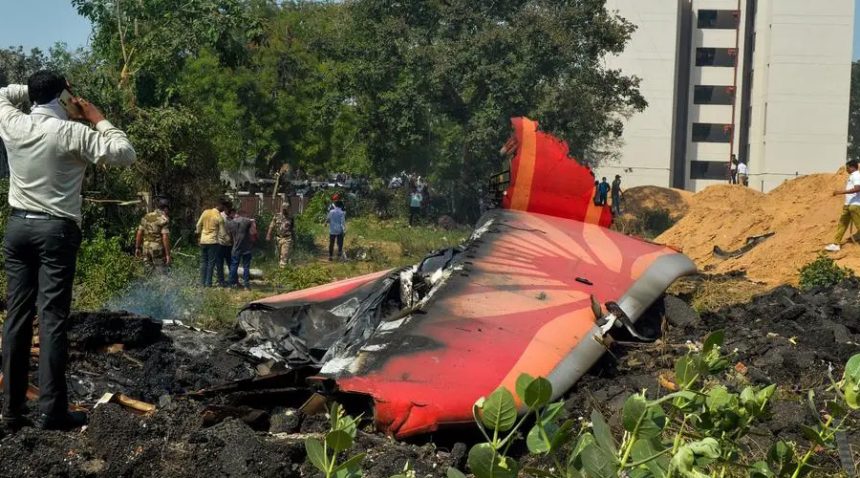The tragic Air India crash shakes markets, but is the aviation sector’s long-term growth still safe
The tragic Air India plane crash on June 12, 2025, shocked the world and raised serious concerns in the aviation industry. Many investors and travelers are now wondering if this incident will damage the strong growth that aviation stocks have enjoyed in recent years. To understand the possible effects, it is important to review what happened, how markets have reacted, and what the future might hold for aviation companies.
The Crash Details
On June 12, Air India Flight 171, a Boeing 787-8 Dreamliner, crashed shortly after taking off from Ahmedabad. The flight was on its way to London with 242 people on board. Tragically, only one person survived the accident. The plane crashed into a hostel building at a nearby medical college, killing over 38 people on the ground and injuring more than 60 others.
Investigators are now focusing on several possible causes for the crash. Early reports suggest that the plane may have suffered mechanical failures involving its engine, landing gear, or wing flaps. Until the final investigation reports are released, the exact cause remains unknown. As a precaution, India’s aviation authority has ordered emergency inspections of all Boeing 787 aircraft operating in the country.
Immediate Stock Market Reactions
The crash had an instant effect on aviation stocks, both in India and around the world. Investors quickly sold shares due to concerns about safety, possible lawsuits, higher insurance costs, and the overall impact on the industry.
In India, stocks of leading airlines dropped sharply:
IndiGo, operated by InterGlobe Aviation, saw its shares fall by as much as 6% in intraday trading.
SpiceJet also experienced a decline of around 3% to 5%.
These drops were caused not only by safety fears after the crash but also by rising fuel costs, which have been increasing due to geopolitical tensions in the Middle East.
The crash also affected companies outside India:
Boeing’s shares dropped by about 5% to 6% since the aircraft involved was one of its Boeing 787 models. Although no evidence yet points to a manufacturing flaw, investors are cautious.
GE Aerospace, which makes the engines used in many Boeing 787 planes, saw its stock decline by roughly 2% to 4%.
Singapore Airlines, which owns a 25% stake in Air India, saw its shares fall by approximately 1.3%.
Other global airlines in Europe and the United States also experienced small dips in their stock prices as investors worried about possible ripple effects across the aviation sector.
Short-Term Impact on the Aviation Industry
The immediate reaction to any major plane crash is always sharp. In the short term, airlines and manufacturers face several challenges:
Extra Inspections and Delays
Following the crash, India’s Directorate General of Civil Aviation ordered inspections of all Boeing 787s. These checks focus on areas such as flaps, engines, and landing gear. While these inspections are necessary for safety, they may cause temporary delays and increased maintenance costs for airlines.
Higher Insurance Premiums
After a major crash, insurance companies often raise premiums for airlines, especially those operating similar aircraft models. This means that operating costs for airlines like Air India and IndiGo could rise, affecting their profits in the short term.
Passenger Fear and Travel Demand
Plane crashes often lead to a short-term dip in passenger confidence. However, historical trends show that air travel usually rebounds quickly. People may hesitate to fly immediately after such incidents, but most return to flying within a few months once safety checks reassure the public.
Medium and Long-Term Outlook
Despite the serious nature of the Air India crash, the long-term future of the aviation industry may remain strong. Several factors suggest that the growth trajectory of aviation stocks is unlikely to be permanently derailed.
Continued Fleet Expansion
India remains one of the fastest-growing aviation markets in the world. Airlines in the country have ambitious plans to expand their fleets, with over 600 new aircraft expected to be added in the next five years. These plans are supported by growing domestic and international travel demand.
Improved Safety Regulations
Authorities will likely introduce stricter safety inspections and oversight following the crash. This could temporarily slow operations, but it will help rebuild passenger trust over time. Better regulations and safety standards often lead to stronger, more reliable industry growth.
Boeing’s Business Impact
This crash is the first fatal accident involving the Boeing 787 since it was introduced. Investigations may lead to closer scrutiny of Boeing’s manufacturing and safety processes. However, Boeing still has a large backlog of orders—around 6,500 planes—and remains a key supplier to airlines worldwide. The demand for new aircraft continues to be strong, and Boeing recently received approval to increase production of both the 787 and 737 MAX models.
Stable Passenger Growth
Even with setbacks, global air travel remains on a steady growth path. Following the COVID-19 pandemic, travel demand has rebounded strongly. In the United States, domestic bookings remain stable, and international travel is only slightly below pre-pandemic levels. In India, the aviation sector continues to expand, solidifying its place as the world’s third-largest aviation market.
Other Pressures Affecting Aviation Stocks
While the Air India crash is a major event, other global factors are also influencing aviation stocks at this time:
Rising Fuel Prices
Tensions in the Middle East have led to a surge in oil prices. Crude oil prices have risen by 8% to 10% recently, squeezing profit margins for airlines, which already operate on thin margins. Higher fuel prices can significantly increase operating costs for carriers.
Ongoing Demand for Air Travel
Despite higher ticket prices caused by rising fuel costs, demand for air travel remains strong. Many people continue to travel for work, leisure, and family reasons. This continued demand supports airline revenues and stock prices.
India’s Growing Aviation Market
India is experiencing one of the fastest growth rates in the aviation world. A growing middle class, increasing tourism, and expanding business travel continue to drive strong demand for domestic and international flights.
Final Thoughts: Will Aviation Stocks Recover
The Air India crash is a heartbreaking event that immediately shook investor confidence and placed new pressure on the aviation industry. However, the factors driving long-term growth in aviation remain in place. Rising incomes, expanding travel demand, and airline fleet growth continue to support the industry’s positive outlook.
While short-term challenges like safety investigations, higher insurance premiums, and rising fuel prices will temporarily affect profitability, these headwinds are not expected to cause lasting damage to aviation stocks. Once investigators complete their reports and airlines address any necessary safety improvements, investor confidence is likely to return.
Overall, the Air India crash is unlikely to derail the aviation sector’s long-term growth. Aviation stocks may experience short-term volatility, but the fundamentals behind the industry’s expansion remain strong and should continue to support growth over the coming years.





